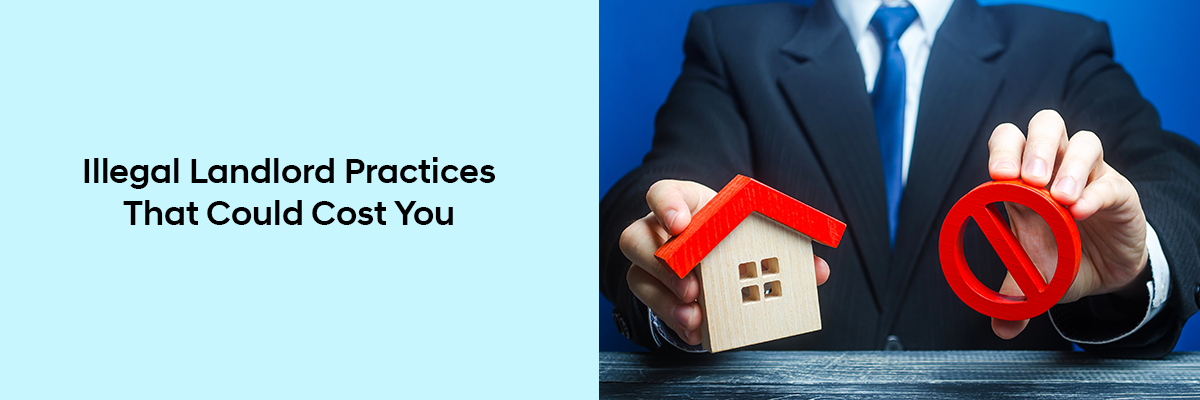Being a landlord is about more than just collecting rent. It comes with legal responsibilities and the duty to ensure tenants feel safe and respected in the property they rent. While landlords naturally want to maximize profits, there are limits set by local and federal laws that cannot be ignored.
Sometimes, landlords knowingly or unknowingly cross those boundaries. These mistakes might seem small at first, but they can lead to serious legal issues, financial penalties, or even lawsuits. Let’s look at some common illegal practices landlords should avoid, and what they can do instead to stay on the right side of the law.



1. Discrimination in Renting
Discrimination is one of the most common and serious violations landlords can commit. It can show up in different ways:
- Advertising rental properties as “no kids,” “no pets,” or “only for singles.”
- Showing preference for tenants based on race, religion, gender, or marital status.
- Restricting tenants from practicing their cultural or religious traditions, for example, telling a Hindu tenant not to celebrate a festival because other tenants may not like it.
What landlords should do instead:
- Follow the Fair Housing Act (or local housing laws) which prohibits discrimination based on race, color, religion, sex, disability, family status, or national origin.
- Treat every tenant and applicant fairly, regardless of personal characteristics.
- Allow reasonable accommodations for religious or cultural practices as long as they do not harm the property or other tenants’ rights.
To know more about Who is Not Protected Under the Fair Housing Act, read our in-depth blog.
2. Excessive or Unjustified Rent Increases
Raising rent is normal, but doing it unfairly or excessively can cross into illegal territory, especially in areas with rent control or rent stabilization laws. Some landlords increase rent frequently or without proper notice just to squeeze out more income, but this can land them in legal trouble.
What landlords should do instead:
- Review local laws before increasing rent; many cities require landlords to follow specific rules about how much and how often rent can go up.
- Provide proper written notice to tenants before implementing a rent increase.
- Keep rent increases reasonable and tied to legitimate factors like property maintenance, taxes, or inflation.
To know more about How Much Can a Landlord Increase Rent in New York, read our in-depth blog.
3. Neglecting Tenant Screening
When properties sit vacant, landlords may rush to fill them without doing proper background checks. Skipping tenant screening, such as criminal history, credit checks, or rental history, can put other tenants and the property itself at risk.
What landlords should do instead:
- Always run thorough background checks on potential tenants.
- Apply the same screening process to all applicants to avoid discrimination claims.
- Balance fairness with safety, screening is about protecting the property and community, not unfairly excluding applicants.
To know more about California Tenant Screening Laws, read our in-depth blog.
4. Ignoring the “First Come, First Served” Principle
Some landlords delay approving applications, waiting for someone with better financial history, even if earlier applicants are qualified. This can be seen as unfair treatment and, in some jurisdictions, may be illegal.
What landlords should do instead:
- Process applications in the order they are received.
- Have clear, consistent, and written tenant selection criteria (income requirements, credit score, rental history, etc.).
- Apply those criteria equally to all applicants to avoid accusations of favoritism.
5. Cutting Costs by Skipping Maintenance
Property maintenance is not optional, it’s a legal obligation. Some landlords try to save money by delaying or ignoring repairs, but this not only frustrates tenants, it can also violate habitability laws. For example, failing to fix leaks, broken heating systems, or mold issues can quickly become a legal problem.
What landlords should do instead:
- Respond to maintenance requests promptly.
- Keep records of repair requests and completed work.
- Perform regular inspections to identify issues before they become emergencies.
- Remember that well-maintained properties attract better tenants and justify fair rent increases.
How Landlords Can Protect Themselves from Legal Issues
Avoiding these mistakes isn’t only about protecting profits, it’s about respecting the law and treating tenants fairly. Landlords who ignore these responsibilities risk lawsuits, fines, or even losing the right to rent out their properties. Here are key steps to stay on the right side of the law:
- Follow the law: Always comply with local housing regulations, rent control policies, and federal laws like the Fair Housing Act.
- Be impartial and fair: Treat every tenant and applicant equally, no favoritism, discrimination, or unfair treatment.
- Do not cut corners: Avoid practices that might seem profitable short-term but create legal risks, like skipping maintenance or forcing unfair rent hikes.
- Create clear policies: Put rental policies in writing for tenant screening, rent increases, and maintenance, and apply them consistently.
- Keep good records: Document all communications, maintenance requests, and financial transactions. Strong records are your best defense in a dispute.
- Get professional help: Work with a property manager or consult a landlord-tenant attorney to stay compliant and avoid costly mistakes.
- Invest in insurance: Landlord insurance can provide financial protection in case of disputes or liability claims.
Final Thoughts
Being a landlord can be profitable, but it comes with legal responsibilities that cannot be ignored. Discrimination, unjust rent increases, poor screening practices, favoritism, and neglecting maintenance are all mistakes that can cost landlords dearly.
By staying informed, acting fairly, and keeping tenant well-being in mind, landlords can protect themselves from lawsuits and build stronger, more sustainable rental businesses.
In the end, doing things the right way isn’t just about avoiding legal trouble, it’s about creating a positive rental experience that benefits both landlords and tenants. Property Management training can also help landlords stay informed about best practices and evolving legal standards. It’s advisable for landlords to consult legal professionals or property management experts to ensure full compliance with these new regulations.


